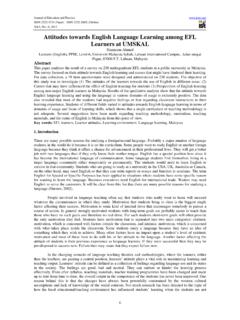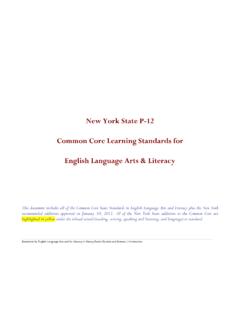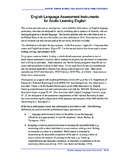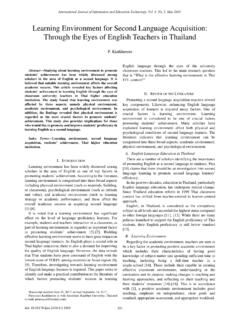Transcription of Literature and English Language Teaching and Learning: A …
1 English Language Teaching ; Vol. 7, No. 3; 2014 ISSN 1916-4742 E-ISSN 1916-4750 Published by Canadian Center of Science and Education 85 Literature and English Language Teaching and learning : A Symbiotic Relationship Richard C. Ihejirika1 1 Directorate of General Sutdies, Federal University of Technology, Owerri, Nigeria Correspondence: Richard C. Ihejirika, Directorate of General Sutdies, Federal University of Technology, Owerri, Nigeria. Tel: 80-3376-4807. E-mail: Received: November 4, 2013 Accepted: January 9, 2014 Online Published: February 12, 2014 URL: Abstract A close look at Literature and Language shows that the two are closely related.
2 This close relationship is obvious because from all indications, Literature presupposes Language . It is inconceivable to discuss Literature without reference to Language . But going by the traditional practice at the secondary school level in Nigerian context, there are indications that Literature and English Language are treated as two separate school subjects. At the senior secondary school level, the subjects are taught in different classroom settings by teachers that are either designated Literature teachers or English teachers.
3 By this dichotomy, the Literature teachers, to a large extent, pre-occupy their Teaching period with the Teaching of the stories, the contents and the socio-cultural, economic and religious implications of the prescribed literary texts without placing much emphasis on the Language components of the texts. In the end, some students have been found to have done very well in the Literature exams but perform poorly in English Language . Against this background, this paper posited that the relationship between Literature and Language is symbiotic.
4 It was, therefore, suggested that the relationship should be explored and exploited in order to enhance effective Teaching and learning of Literature and English Language at the secondary school level so that the learners would possess high level of proficiency in the use of English Language , which would ultimately contribute immensely in addressing the seeming poor academic performance at the secondary and tertiary levels of education in Nigeria. Some suggestions for effective Teaching and learning of Literature and English Language were made.
5 Keywords: Literature , English Language , Language Teaching and learning , symbiotic relationship 1. Introduction The significant role of English Language in the linguistic, educational, socio-economic and cultural settings of Nigeria is not in doubt. In the field of education in particular, English Language plays a dominant role. As the Language for education and by extension the target Language , the success or failure of formal education, to a large extent, depends on the level of competence of learners in English Language in schools and colleges.
6 Unfortunately, in contemporary time, available evidence in the way our students use English in our schools and colleges shows that their English Language competence and English Language awareness leave much to be desired (Onukaogu, 2002, p. 300). For instance, it is common knowledge that a good number of secondary school leavers and tertiary institution graduates hardly express themselves fluently in both spoken and written English , and this anomaly has been found to be partly responsible for the poor academic performance threatening all levels of education in Nigeria.
7 As to what is typically responsible for the poor performance in English Language among students, myriad of reasons have been advanced by scholars. For instance, Ubahakwe (1988) identifies a couple of factors which among other things include the educational setting, the educational system, teachers status and motivation, the examination pattern, the learning environment, teacher preparation and Language philosophy. Ayodele (1988) states that the causes of the abysmal performance in English Language must be traced to the classroom because the formal classroom practices provide by far the greatest avenue for the learning of the Language .
8 Babatunde (2002, p. 130) identifies the classroom factors to include: teachers low level of competence in the Language skills, especially reading; unduly large classroom; too many periods per week; lack of incentive; and learners unserious attitude among others. Another classroom factor threatening effective acquisition of English Language is the method of Teaching Literature which separates it from English Language . By this method, English Language Teaching Vol.
9 7, No. 3; 2014 86 Literature classroom is different from that of English Language . Consequently, the resources of Literature , which have the potentialities of enhancing effective Language learning , are denied the learners. This practice, no doubt, could be said to have inhibited effective Teaching and learning of Literature and English Language in our schools and colleges. No wonder a good number of Nigerian secondary school students hardly express themselves sufficiently in English even after they had offered Literature and had a good grade in it.
10 In the light of the foregoing, the thrust of this paper is to establish the fact that there is a symbiotic relationship between Literature and Language ; and further demonstrate how Literature could be integrated with English Language Teaching and learning in an ESL setting for effective result. 2. The Concept and Functions of Literature The term Literature is used basically in two different senses. First, it is used to refer to any written material on a subject. Second, it is a term used to refer to one of the school subjects studied by students or a university discipline; and it is this second sense that applies to us in this context.















